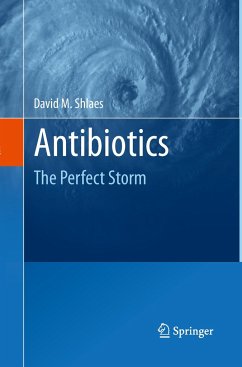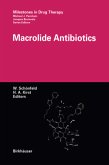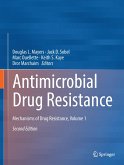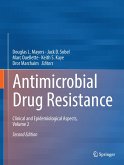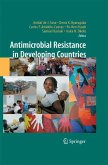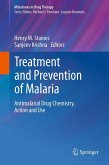Antibiotics are truly miracle drugs. As a class, they are one of the only ones that actually cure disease as opposed to most drugs that only help relieve symptoms or control disease. Since bacteria that cause serious disease in humans are becoming more and more resistant to the antibiotics we have today, and because they will ultimately become resistant to any antibiotic that we use for treatment or for anything else, we need a steady supply of new antibiotics active against any resistant bacteria that arise. However, the antibiotics marketplace is no longer attractive for large pharmaceutical companies, the costs of development are skyrocketing because of ever more stringent requirements by the regulatory agencies, and finding new antibiotics active against resistant strains is getting harder and harder. These forces are all combining to deny us these miracle drugs when we need them the most. I provide a number of possible paths to shelter from this perfect storm.
From the reviews:
There can be few if any individuals in the world more qualified than David Shlaes to tackle the subject of antibiotics and the coming crisis posed by the twin problems of developing resistance among major human pathogens and a dwindling output of new agents with which to combat the serious infections they cause. As Dr. Shlaes clearly points out, all of this is compounded by rapid consolidation of the pharmaceutical industry and failure of regulatory agencies (especially in the United States) to provide effective oversight and guidance. Shlaes has done it all. He is a physician who knows clinical medicine, a researcher who has studied antimicrobial resistance, an administrator who has served effectively to develop new antibiotics in industry, and a consultant who understands the Food and Drug Administration from intense personal involvement. He is also a talented writer who has made this subject fascinating and understandable, even to the non-scientist! His effective use of personal vignettes and inside reporting adds to the pleasure in reading this spell-binding account. Robert C. Moellering, Jr., M.D. Shields Warren-Mallinckrodt Professor of Medical Research Harvard Medical School Department of Medicine Beth Israel Deaconess Medical Center Boston, MA USA Society is facing two converging crises: increasing antibiotic resistance and dying antibiotic development. Few understand these crises better than Dr. Shlaes, who spent years treating patients as an academic physician-scientist and then spent years in industry overseeing efforts to develop new antibiotics. In Antibiotics - The Perfect Storm, Dr. Shlaes explains how society has reached the desperate straights we are in, and describes what can be done to turn around the antibiotic crisis. His book offers a scathing, behind-the-scenes view into pharmaceutical companies and federal agencies which regulate them. Brad Spellberg Division of General InternalMedicine, Los Angeles Biomedical Research Institute at Harbor-UCLA Medical Center; and David Geffen School of Medicine at UCLA
"A perfect storm describes a rare confluence of elements coming together to create a situation for the worst possible damage. ... Shales does offer very practical, realistic policy solutions for industry, researchers, the government, and society. Summing Up: Recommended. All academic audiences, from lower-level undergraduates through health care professionals/practitioners, especially those doing research and planning." (J. D. Campbell, Choice, Vol. 48 (9), May, 2011)
There can be few if any individuals in the world more qualified than David Shlaes to tackle the subject of antibiotics and the coming crisis posed by the twin problems of developing resistance among major human pathogens and a dwindling output of new agents with which to combat the serious infections they cause. As Dr. Shlaes clearly points out, all of this is compounded by rapid consolidation of the pharmaceutical industry and failure of regulatory agencies (especially in the United States) to provide effective oversight and guidance. Shlaes has done it all. He is a physician who knows clinical medicine, a researcher who has studied antimicrobial resistance, an administrator who has served effectively to develop new antibiotics in industry, and a consultant who understands the Food and Drug Administration from intense personal involvement. He is also a talented writer who has made this subject fascinating and understandable, even to the non-scientist! His effective use of personal vignettes and inside reporting adds to the pleasure in reading this spell-binding account. Robert C. Moellering, Jr., M.D. Shields Warren-Mallinckrodt Professor of Medical Research Harvard Medical School Department of Medicine Beth Israel Deaconess Medical Center Boston, MA USA Society is facing two converging crises: increasing antibiotic resistance and dying antibiotic development. Few understand these crises better than Dr. Shlaes, who spent years treating patients as an academic physician-scientist and then spent years in industry overseeing efforts to develop new antibiotics. In Antibiotics - The Perfect Storm, Dr. Shlaes explains how society has reached the desperate straights we are in, and describes what can be done to turn around the antibiotic crisis. His book offers a scathing, behind-the-scenes view into pharmaceutical companies and federal agencies which regulate them. Brad Spellberg Division of General InternalMedicine, Los Angeles Biomedical Research Institute at Harbor-UCLA Medical Center; and David Geffen School of Medicine at UCLA
"A perfect storm describes a rare confluence of elements coming together to create a situation for the worst possible damage. ... Shales does offer very practical, realistic policy solutions for industry, researchers, the government, and society. Summing Up: Recommended. All academic audiences, from lower-level undergraduates through health care professionals/practitioners, especially those doing research and planning." (J. D. Campbell, Choice, Vol. 48 (9), May, 2011)

